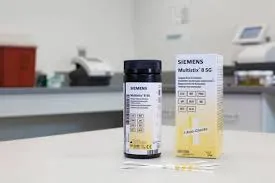Jul . 11, 2024 02:14 Back to list
Buy OPK from top pregnancy test manufacturers for accurate results and reliability.
OPK, or ovulation predictor kit, is a useful tool for women who are trying to conceive. However, many people may not realize that OPKs can also be used as a pregnancy test. In fact, some manufacturers specifically market their OPKs as dual-use tests for both ovulation and pregnancy.
OPKs work by detecting luteinizing hormone (LH) in a woman's urine. LH is a hormone that surges just before ovulation, signaling that an egg is about to be released. This LH surge is what OPKs are designed to detect, helping women pinpoint the most fertile time in their cycle.
But LH is chemically similar to human chorionic gonadotropin (hCG), the hormone that is produced in large quantities during pregnancy. This means that OPKs can also pick up hCG in a woman's urine, potentially detecting a pregnancy.
While OPKs can technically be used as pregnancy tests, it is important to note that they are not as sensitive as traditional pregnancy tests. This means that they may not be able to detect a pregnancy as early as a dedicated pregnancy test would. For the most accurate results, it is best to use a pregnancy test that is specifically designed for that purpose

buy opk as pregnancy test manufacturers. That being said, using an OPK as a pregnancy test can be a cost-effective option for some women. If you already have OPKs on hand for tracking ovulation, you may be able to use them to test for pregnancy as well. Just keep in mind that you may need to wait a bit longer after a missed period to get an accurate result. Some manufacturers have recognized the dual-use potential of OPKs and market their products as both ovulation and pregnancy tests. These tests typically come with instructions for how to interpret the results for each purpose. If you are considering using an OPK as a pregnancy test, be sure to carefully read the instructions provided by the manufacturer. In conclusion, while OPKs are primarily used for tracking ovulation, they can also be used as pregnancy tests in a pinch. Just be aware that they may not be as sensitive as traditional pregnancy tests and may not give you accurate results as early in a pregnancy. If you are unsure about the results of an OPK pregnancy test, it is always best to follow up with a dedicated pregnancy test or speak with your healthcare provider for further guidance.

buy opk as pregnancy test manufacturers. That being said, using an OPK as a pregnancy test can be a cost-effective option for some women. If you already have OPKs on hand for tracking ovulation, you may be able to use them to test for pregnancy as well. Just keep in mind that you may need to wait a bit longer after a missed period to get an accurate result. Some manufacturers have recognized the dual-use potential of OPKs and market their products as both ovulation and pregnancy tests. These tests typically come with instructions for how to interpret the results for each purpose. If you are considering using an OPK as a pregnancy test, be sure to carefully read the instructions provided by the manufacturer. In conclusion, while OPKs are primarily used for tracking ovulation, they can also be used as pregnancy tests in a pinch. Just be aware that they may not be as sensitive as traditional pregnancy tests and may not give you accurate results as early in a pregnancy. If you are unsure about the results of an OPK pregnancy test, it is always best to follow up with a dedicated pregnancy test or speak with your healthcare provider for further guidance.
Latest news
-
Dengue NS1 Rapid Diagnostic Test Kit
NewsMar.07,2025
-
Dengue NS1 Rapid Diagnostic Test Kit
NewsMar.07,2025
-
Dengue NS1 Rapid Diagnostic Test Kit
NewsMar.07,2025
-
Transferrin Rapid Test Cassette Tumor Marker TF Card
NewsMar.07,2025
-
Malaria Pf Pan Rapid Diagnostic Test Kit
NewsMar.07,2025
-
malaria pf / pan ag rapid test
NewsMar.07,2025

